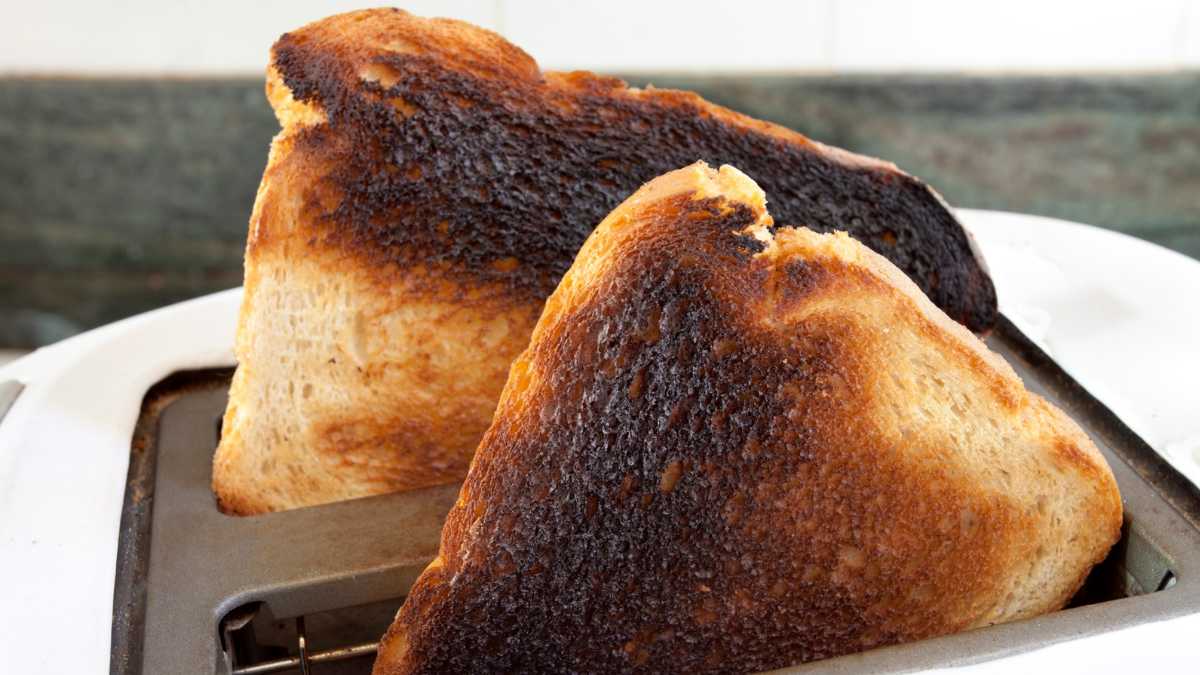Possible health risks of acrylamide, a chemical formed when starchy foods are subjected to a high temperature, are being highlighted by the U.K. Food Standards Agency. Browned toast and potatoes are two examples of foods being cautioned against.
The recommendation is to “Go for Gold”, in other words, when frying, baking, toasting or roasting starchy foods like potatoes, you should aim for a golden yellow color or lighter.
Acrylamide Risks
Acrylamide is a chemical compound naturally produced when foods high in starch are fried or baked at high temperatures (above about 250° F). It can be found in potatoes, chips, crisps, bread, and other cereal and wheat products.
Concerns were raised in 2002 when it was found that acrylamide can cause cancer in mice, but only when the mice were exposed to massive doses – 900 times what a human would typically be exposed to. A 2012 study showed evidence that rodents exposed to high levels of acrylamide develop cancer.
It is currently unclear whether a similar risk exists in human. There is a possibility that prolonged exposure to acrylamide through eating acrylamide-rich food for many years could increase the risk.
Acrylamide is currently defined by the World Health Organization as “probably carcinogenic to humans”.
This means that while no definitive proof has been found that acrylamide is carcinogenic, as a precaution exposure to acrylamide should ideally be limited to as little as possible.
What Does The Food Standards Agency Advise?
The FSA offer the following four tips:
- Go for gold – as a general rule of thumb, aim for a golden yellow color or lighter when frying, baking, toasting or roasting starchy foods like potatoes, root vegetables and bread.
- Check the pack – check for cooking instructions on the pack and follow carefully when frying or oven-cooking packaged food products such as chips, roast potatoes and parsnips. The on-pack instructions are designed to cook the product correctly. This ensures that you aren’t cooking starchy foods for too long or at temperatures that are too high.
- Eat a varied and balanced diet – while we can’t completely avoid risks like acrylamide in food, eating a varied, balanced and healthy diet will help reduce your risk of cancer. Read more advice about eating a balanced diet.
- Don’t keep raw potatoes in the fridge – don’t store raw potatoes in the fridge if you intend to cook them at high temperatures (e.g. roasting or frying). Storing raw potatoes in the fridge may lead to the formation of more free sugars in the potatoes (a process sometimes referred to as “cold sweetening”) and can increase overall acrylamide levels especially if the potatoes are then fried, roasted or baked. Raw potatoes should ideally be stored in a dark, cool place at temperatures above 6C.
The FSA reports that it is working with the food industry to identify and implement measures to reduce acrylamide levels in food. Examples could include:
- selecting potato varieties with low levels of reducing sugars that are suitable for baking, roasting or frying
- bread manufacturers reducing the time and temperature during baking to avoid excessive browning of the crust
Managing Risk Over A Lifetime
Steve Wearne, director of policy at the FSA, has responded to media criticisms by saying:
“We are not saying people should worry about the occasional meal… this is about managing risk over a lifetime. Anything you can do to reduce your exposure will reduce your lifetime risk. People might, for example, think ‘I like my roast potatoes crispy’, but they will just decide to have them less often.”
The occasional slice of burnt toast isn’t going to kill you and the link between acrylamide and cancer in humans is unproven.
But as Cancer Research UK rightly points out, a diet consisting of mainly calorie rich starchy foods, whether or not there is any specific link to cancer, should be avoided on general health grounds.
2014 Final Report
UK Total Diet Study
FS102081
Janneke G Hogervorst, Leo J Schouten, Erik J Konings, R Alexandra Goldbohm, and Piet A van den Brandt
Dietary acrylamide intake and the risk of renal cell, bladder, and prostate cancer
Am J Clin Nutr May 2008 vol. 87 no. 5 1428-1438
Related Posts:
- Treating ADHD May Reduce Risk Of Drug Abuse
- Pesticide Deltamethrin May Increase Risk Of ADHD
- Whey Protein May Reduce Heart Disease And Stroke Risk
Last Updated on December 14, 2022
